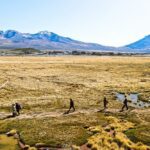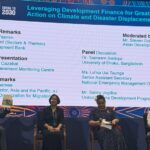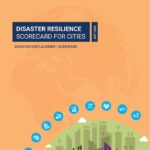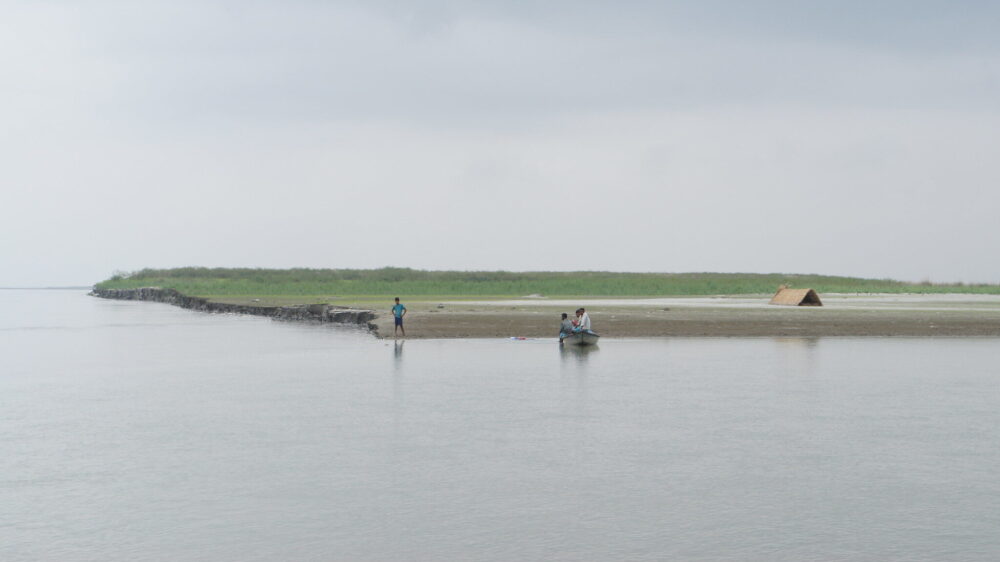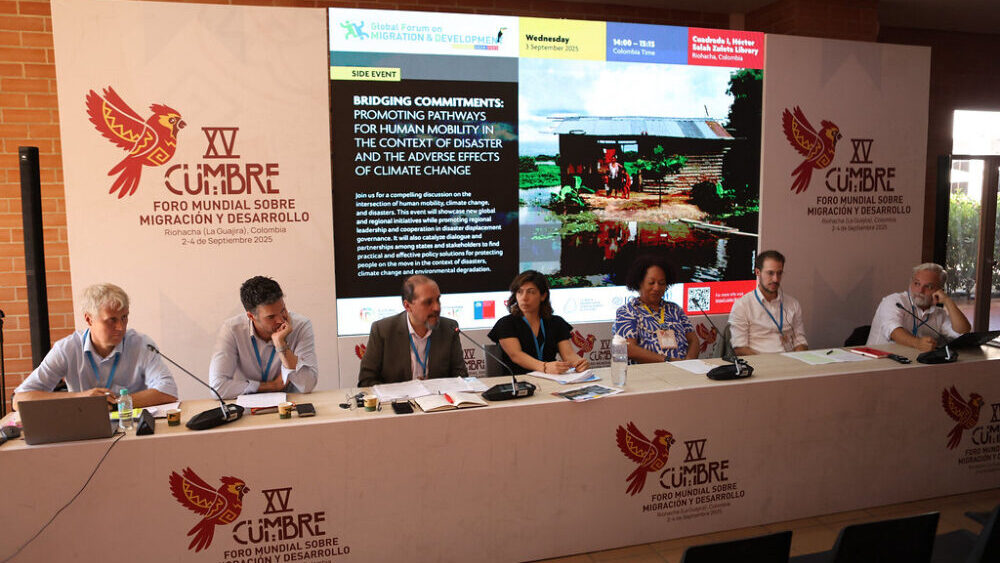Reporting Back 34th RCRC Conference – Highlighted Anticipatory Response and Locally-led Action
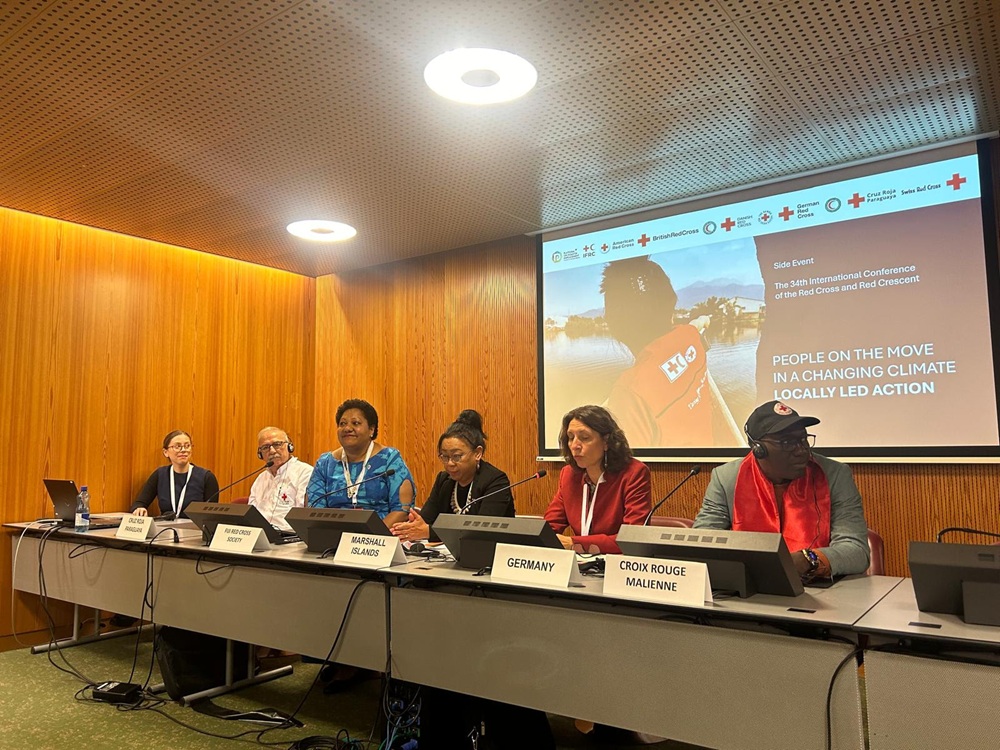
Geneva, Switzerland– The 34th International Conference of the Red Cross and Red Crescent (RCRC Conference) took place from 28 to 31 October 2024 in Geneva, Switzerland and brought together leaders, policymakers, and humanitarian actors from around the world to address the pressing challenges facing vulnerable communities globally.
The RCRC conference is held every four years. The theme of this conference was “Navigate Uncertainty – Strengthen Humanity” and human mobility in the context of disasters and climate change was prominently discussed in several spotlight sessions and side events against the backdrop of the first-ever Migration Strategy for the International Red Cross and Red Crescent Movement 2024-2030 being unanimously endorsed during the 2024 Council of Delegates on 27 October 2024, right before the beginning of the conference.
While this Strategy focuses on the risks and vulnerabilities that arise in the context of migration, it reflects an appreciation of the links that may exist between internal displacement and cross-border movement and the need for holistic and coordinated responses where appropriate.”- from the Migration Strategy.
One of the outcomes of the RCRC Conference relevant to the PDD’s work on disaster displacement was also the resolution on Strengthening disaster risk governance through comprehensive legal and regulatory frameworks which mentioned regarding innovative approaches to disaster risk management that,
States [are] to strengthen their relevant legal and regulatory frameworks to prevent and reduce disaster risks and the humanitarian impacts of disasters, especially on persons in vulnerable situations, and to consider, as appropriate to their circumstances, whether they include provisions to reduce the risk of displacement due to disasters, assist those who are displaced and support them in finding solutions.”
Partner Event: Advancing the Protection of Persons in the Event of Disasters
The Permanent Mission of the Republic of the Philippines in Geneva, the International Federation of Red Cross and Red Crescent Societies (IFRC) and the PDD co-organized a side event entitled “Advancing the Protection of Persons in the Event of Disasters: Exploring Multi-stakeholder Perspectives, Practice Insights and Legal Frameworks” on 28 October 2024.
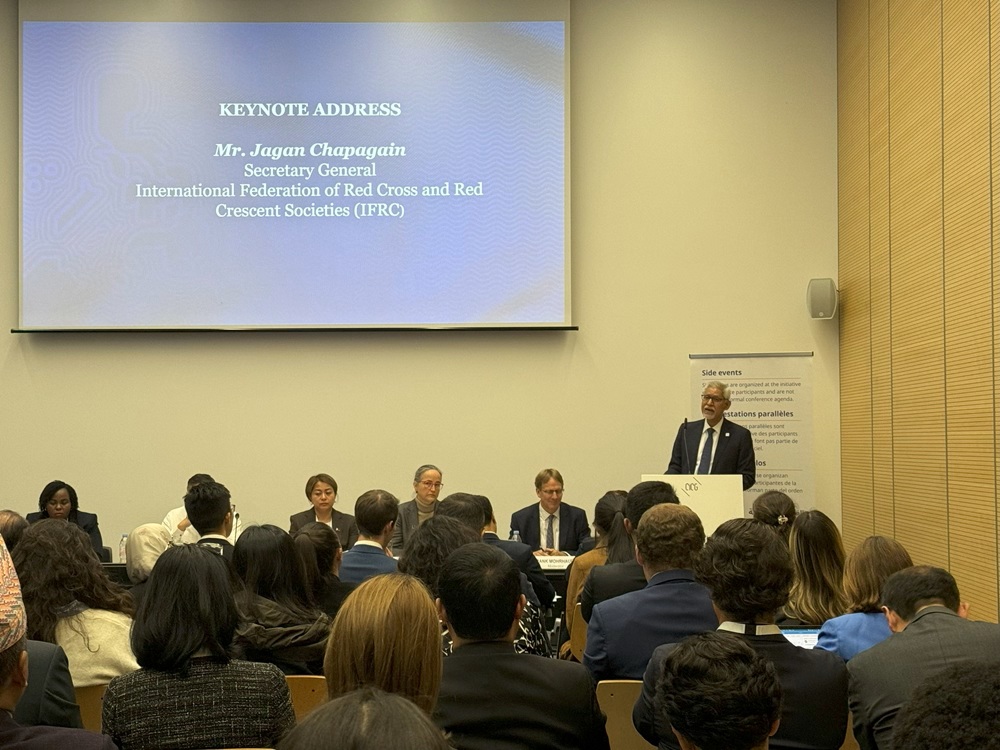
The Draft Articles for the Protection of Persons in the Event of Disasters (PPED) , adopted by the International Law Commission (ILC) in 2016, aim to establish international guidelines to ensure the safety, dignity, and rights of people affected by disasters.
The event featured a distinguished lineup of speakers, starting with keynote speaker Mr. Jagan Chapagain, Secretary General of the International Federation of Red Cross and Red Crescent Societies (IFRC). The panel discussion was moderated by Mr. Frank Mohrhauer, IFRC’s Director of National Society Development Services. The panelists included Ms. Irene Dumlao, Assistant Secretary for the Disaster Response and Management Group at the Department of Social Welfare and Development in the Philippines; and Ms. Jenty Kirsch-Wood, Head of Global Risk Management & Reporting and Senior Programme Management Officer at the United Nations Office for Disaster Risk Reduction (UNDRR).
To read the full article on this event, click here.
Partner Event: People on the Move in a Changing Climate: Locally Led Action
The International Federation of Red Cross and Red Crescent Societies (IFRC), several National Societies*, and PDD co-organized a side event entitled “People on the Move in a Changing Climate: Locally Led Action” on 29 October 2024.
The event explored the critical role of locally-led action in promoting resilience and adaptation among those at risk of displacement in the context of disasters and climate change, as well as meeting the needs of those displaced. Ms. Deike Potzel from the German Federal Foreign Office in her introductory remarks underscored Germany’s commitment to supporting communities affected by disaster and climate-induced displacement.
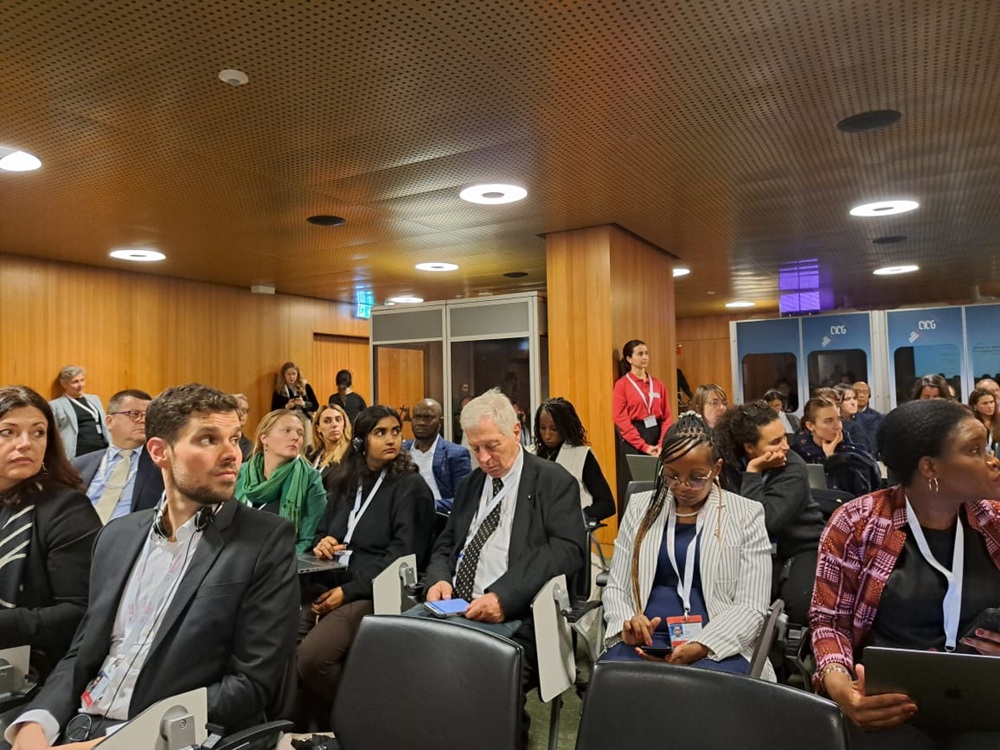
Germany, a founding member of the Platform on Disaster Displacement (PDD) is committed to support locally-led action through different initiatives and partnerships. A goal is to deepen partnerships with local actors, including addressing disaster displacement. Permanent Representative of the Marshall Islands to the UN in Geneva, H.E. Amb. Doreen Debrum, highlighted the urgency to take action on the climate crisis and the need to address associated displacement risks, from the Pacific perspective.
Fiji’s Red Cross Society Director General Ms. Ragigia Dawai also highlighted the Pacific region’s unique and pressing vulnerabilities on the frontlines of the climate crisis:
The Pacific island communities face increasingly severe weather events, coastal erosion, rising sea levels, and frequent cyclones, floods, and droughts, which contribute to the annual displacement of 50,000–60,000 people. Pacific islanders place immense value on their homes, culture, and sense of belonging, often resisting displacement. They don’t want to leave the places they call home.”
The Paraguay Red Cross’s Director of Programs and Operations, Mr. Hector Guex Barrios discussed the National Societies’ efforts to support communities transitioning from rural to urban areas due to climate change, focusing on livelihoods, adaptation, and community-driven planning.
Mr. Makan Boubacar Sissao of the Mali Red Cross outlined their Early Action Protocol (EAP) for flood response, which includes pre-positioning goods and providing timely information to help communities evacuate safely, with plans to expand it to address other hazards.
In the subsequent Townhall segment of the event, different stakeholders shared their experiences on the topic, such as the Germany Red Cross:
When areas such as the Ahr Valley experienced flooding in Germany, one of the only available solutions for wastewater treatment in Germany was a mobile water treatment plant that the German Red Cross had developed for international use. It worked so effectively that the local waterboard asked for two more to be built. This is a great example of how an international solution became locally-led and locally-used. Now the treatment plant is ready for deployment to other flood affected regions.”
H.E. Amb. James Waweru, Permanent Representative of Kenya, as Chair of the PDD, gave closing remarks. He referred to the recent side event that PDD co-organized at UNHCR’s Executive Committee, highlighting the urgency of the topic and need to bridge discussion across institutions and policy silos.
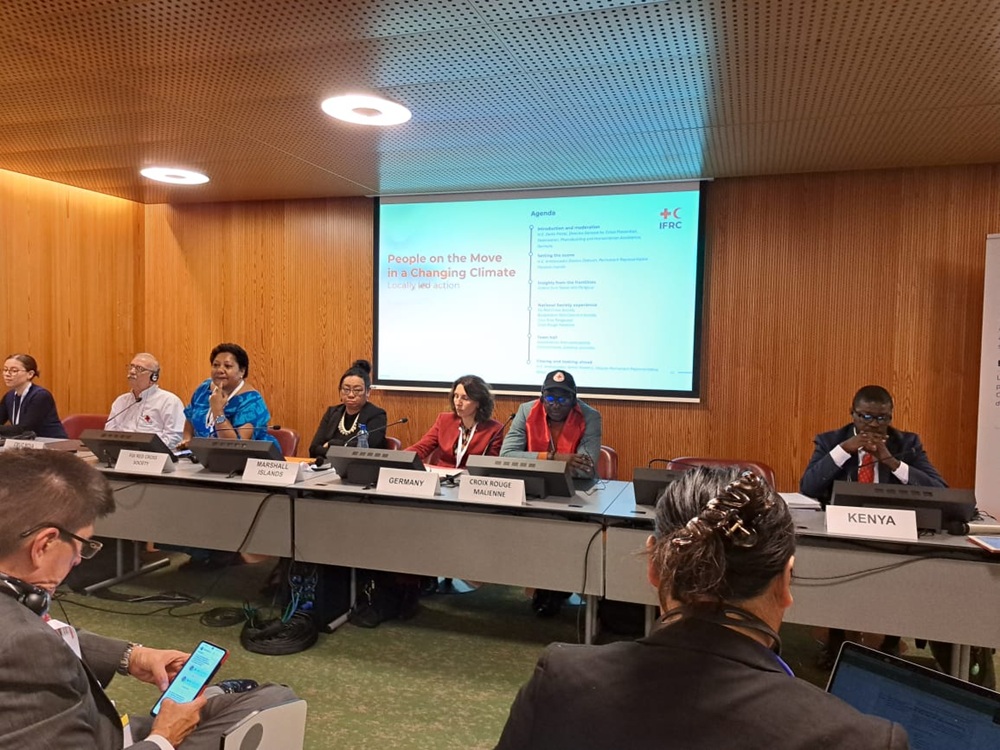
Highlighting the importance of locally led action in the Kenyan national context, he said
Climatic events are more frequent and more intense, especially in the Horn of Africa. Kenya has experienced the worst flooding and worst drought in 40 years. Local action is vital for the needs of vulnerable communities enduring displacement in the context of climate change and disasters.”
He formulated four key actions as take aways from the session that are essential to support local leadership: act early through strong local and national systems, align local and national policies, ensure funding for locally-led adaptation, and foster collaboration among states and humanitarian organizations to reduce disaster risk.
Other Relevant Sessions
Spotlight 2: Working together to reduce the impacts of climate change on communities
This spotlight was moderated by Ms. Nishanie Jayamaha, Co-coordinator of the Secretariat for the Climate and Environment Charter for Humanitarian Organizations and opened by Permanent Representative of Vanuatu to the United Nations in Geneva. H.E. Mr. Sumbue Antas shed light on the impact of food security, access to water and livelihoods in Vanuatu. He highlighted the role of multi-stakeholder cooperation among international organizations to assist vulnerable communities in less wealthy nations who are disproportionately affected by climate change.
Other panelists included Mr. Nouhoum Maiga, Secretary General of Mali Red Cross, Ms. Maseiga Sufo, Youth Representative of Samoa Red Cross, Mr. Carlos Ivan Marquez, President of Colombia Red Cross, and Ms. Julie Arrighi, climate expert from the American Red Cross.
In an in-depth discussion on climate challenges, panelists highlighted the rising risks of severe floods, frequent destructive disasters, inaction on urgent issues, and the particular vulnerabilities of small nations. They underscored the need for integrated efforts from the public sector, private sector, and local communities to address the core drivers of climate change, improve anticipatory action, and strengthen community resilience. Audience members were also engaged in the session, asked to weigh in on four climate priorities for the Movement and encouraged to create personal action plans for meaningful change.
Spotlight 3: Navigating pressing challenges in the context of migration: The importance of a principled humanitarian approach
This spotlight session addressed pressing humanitarian challenges in migration in a context of rising xenophobia, anti-migrant narratives, and stricter migration laws which have heightened humanitarian needs, leading to stigma and discrimination against migrants and refugees.
The opening remarks were delivered by IFRC Secretary General Mr. Jagan Chapagain. He said
We need to dignify the language around migration. As a phrase, ‘migration crisis’ generates a pushback and encourages a securitization approach but migrants don’t often want to migrate. People also return in large numbers.”
Chilean Ambassador Ms. Claudia Fuentes Julio moderated the subsequent panel of Mr. Robert Kwesiga from the Uganda Red Cross, Ms. Laura Jimena Arango Blanco, Counselor for External Relations from the Government of Colombia, Mr. Federico Soda, Director of Humanitarian Response and Recovery from IOM, and Mr. Patrick Eba, Deputy of the Division for International Protection at UNHCR. The panelists discussed, among other topics, the nexus between migration and climate change. Mr. Kwesiga emphasized that cross-border displacement in the context of climate change was still not sufficiently addressed by the international community.
Mr. Eba outlined how in a “world of extremes”, UNHCR is advocating for route-based approaches to address the protection needs of displaced persons. He said
no country alone can address the challenges of mixed movement. We need to offer pathways, address root causes, exercise global solidarity.”
He called for a serious engagement of migrants and refugees, recognizing their voice and agency.
Ambassador Fuentes Julio drew attention to the ongoing negotiations of the Chile Declaration and Plan of Action under the Cartagena+40 process.
*the National Societies hosting the event include American Red Cross, British Red Cross, Bangladesh Red Crescent Society, Danish Red Cross, The Gambia Red Cross Society, German Red Cross, Iraqi Red Crescent Society, Paraguay Red Cross, and the Swiss Red Cross
Header Photo: IFRC


